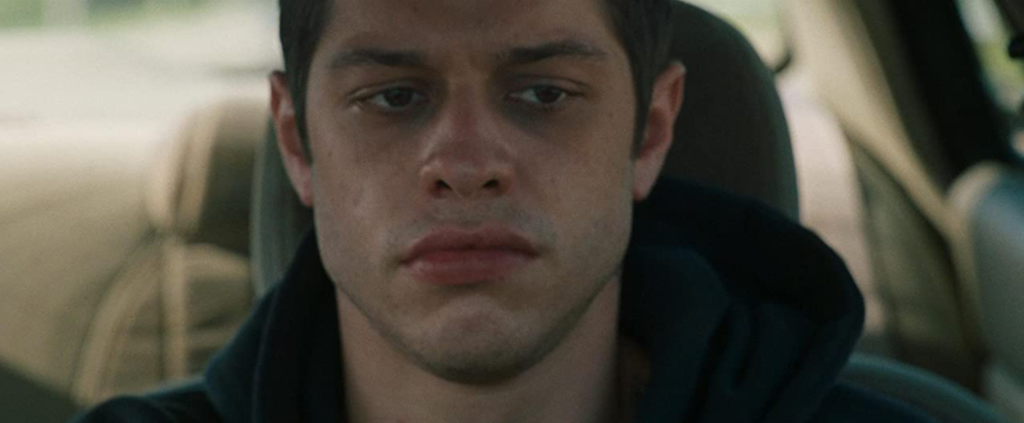
Judd Apatow’s latest installment, The King of Staten Island (2020), is a semi-autobiographical film about comedian and Saturday Night Live star, Pete Davidson, and his life growing up in Staten Island. The generic elements and tropes of the “coming-of-age” narrative are evident throughout, but are showcased through a twenty-four-year-old bum of a character, versus the typical teenage character so often seen in the genre, which offers a refreshing tone to this branded character type ahead of the film. The comedy begins with Davidson’s character, Scott Carlin, cruising on the highway, lost in his own thoughts and likely in the midst of mental breakdown, causing two cars to crash behind him. Now, this opening scene may appear to be intense and even triggering due to the actions described, but The King of Staten Island’s cinematic style, although suggesting there is something wrong in our first glimpse of the protagonist, also keeps the scene contemporary, as rap music blares through the speakers of the vehicle and cameras home in on Scott’s focused face through the overhead mirror. The casual cinematography and the thunderous sound put us right in the car with Scott and, at first, it is hard for us to tell if it is the music that is what has his full focus or something else. When he starts to blink aggressively, eventually clenching his eyes shut for too many seconds too long, this is where the crash comes in. Undoubtedly, the crash was Scott’s fault but, after seeing him in a such a panicked state for unknown reasons, we want to believe that it was not his fault. It is more than obvious that Scott feels terrible about everything, as he mutters “sorry” to himself as he drives off. Already, this seems to be a habit of our deadbeat son and wannabe tattoo artist protagonist: avoiding every emotional confrontation that life throws at him. The cinematography and editing for this film’s introduction alone already set King of Staten Island’s cinematic style apart from Apatow’s other films, letting the audience know that we are in for a more serious comedy from the start.
Scott is not exactly a nobody, per se, seeing that he has a loyal group of friends, all low-life Staten Island natives as well, and an on-and-off romantic fling with childhood pal, Kelsey (Bel Powley), too. Scott enjoys slowing his life down with the enormous amount of weed he smokes on the daily, as he describes to his motivated, completely opposite sister, Claire (Maude Apatow), before she leaves for college. However, reality proves not to be on the same wavelength as Scott’s stoner mindset when his mother, Margie (Marissa Tomei), starts dating an authoritative firefighter, Ray (Bill Burr), and they collectively pressure Scott into finally getting his life together, because let’s face it: everyone knows that Scott is lost — even though he would never admit it. What follows is an emotional roller coaster of a film with many laughs throughout, even when you maybe should not be laughing.
Although The King of Staten Island delivers a feel-good narrative via VOD in the midst of a global pandemic, its candid commentary on mental illness seems to offer something deeper than the deadbeat stoner comedy that it comes across as on the surface. As fans of the director will know, Apatow’s films appear to surround a misunderstood protagonist and somehow, by the end of the film, audiences end up adoring them. Prior to this project, it was another rambunctious comedian, Amy Schumer, in the lovable rom-com, Trainwreck (2015). In the case of The King of Staten Island, though, the misunderstood person takes form in both the character of Scott and comedian Pete Davidson himself. Pete Davidson is quite the controversial comedian, and if you are not a fan, you more than likely do not know about the many illnesses, both mental and physical, that the comedian/actor faces in his everyday life. Davidson is always quite open and honest about both his mental illness, as well as the death of his late firefighter father, who died during the tragic 9/11. While Davidson’s typical dark humor, especially the jokes about his dead father, creeps into nearly all of the film’s dialogue, the scenes that stuck out to me the most were the ones surrounding his evident BPD – Borderline Personality Disorder. Even though Davidson is blunt about the specifics of his illness in real life, his character, Scott, alludes to many of his “issues” as he calls it, but never mentions the disorder by name.
Scott is quick to point out not even ten minutes into the film that not only is he on anti-depressants, but also that “something is wrong” with him mentally, and that he cannot control his impulsive decisions, as he tells to hook-up Kelsey, who wants them to be more than friends with benefits. One would assume, after years of comedies normalizing twenty-something-year-old men with commitment issues, that this was simply a sleazy excuse for Scott to make to avoid putting labels on his relationship with Kelsey. Yet, as the film proceeds, his character continues to prove that he is unable to allow people to be close to him for fear that he will do something to push them away.

This scene, as well as a few that follow, introduces the audience to the real Scott: someone who doesn’t think he deserves to be loved. This is a common thought process in any person dealing with mental illness, but the fact that the film is already from the very beginning so candid about the issue raises awareness and enforces a certain normality for mental health that has been minimized or, worse, sugarcoated, for so long in mainstream cinema. As someone who has struggled with mental illness for years and has yet to see it portrayed casually or authentically in both the media and society until now, this film and the example of Pete Davidson himself showed me that that this is a conversation that more films need to be able to have without running away from the topic and labeling it as too serious or negative.
What is particularly interesting about the film’s conclusion is that it does not have your usual Apatow, Hollywood ending where Amy Schumer dances with the Knicks City Dancers to profess her love to Bill Hader, or even where forty-year-old virgin, Steve Carrell, admits to Catherine Keener that he has never had sex and they still fall in love regardless. Instead, Scott is still the same Scott by the end of the film. Sure, he has become slightly more mature and has accepted that he cannot keep pushing the people who love him away, but other than these mild emotional awakenings, we are left with nearly the same character we started with, proving his character to once more be extremely relatable. When stripped of its comedic bravado, the film lets its audience in a bit deeper, giving us a relatable character, while still providing multiple opportunities for us to laugh and have fun. Unfortunately, the tragedy of the film not being able to be released theatrically during this time, as well as its early release date, does not bode well for its fate in this year’s upcoming awards season; but, regardless, this was one of the best, feel-good films that I have watched in a very long time.
Author Biography

Livi Edmonson is an undergraduate Media Studies major, Creative Writing minor, at Auburn University. She plans on pursuing her MA and PhD in Cinema Studies after she graduates. She currently writes film and television reviews for The Union Recorder in Milledgeville, GA, and plans on pursuing film criticism on a more professional level one day.
Film Details
King of Staten Island (2020)
USA
Director Judd Apatow
Runtime 136 minutes







































